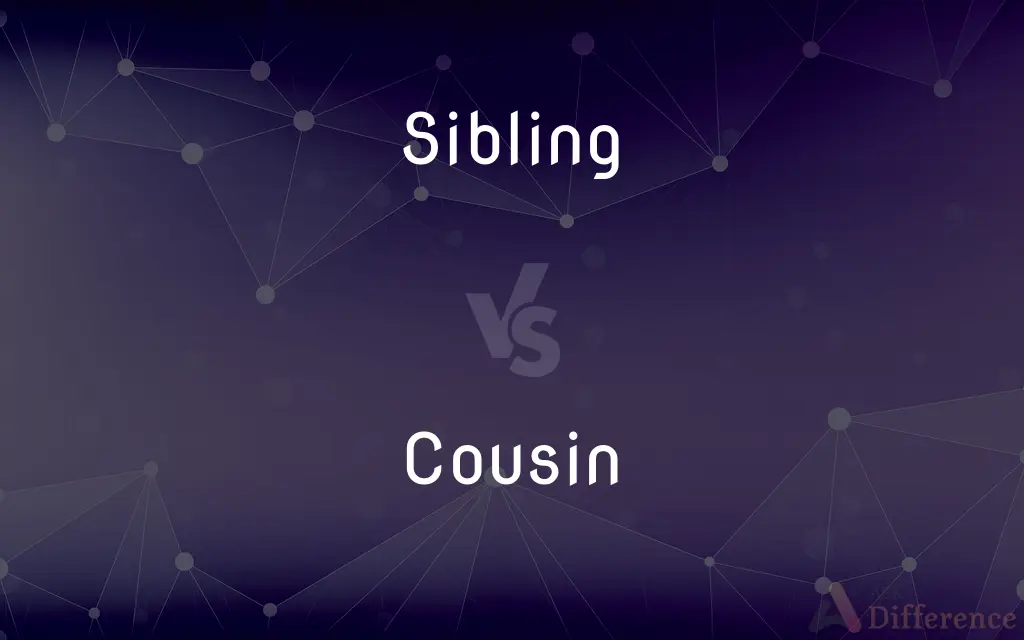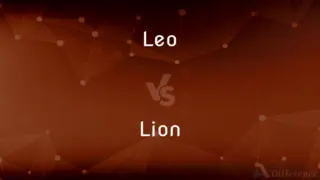Sibling vs. Cousin — What's the Difference?
By Tayyaba Rehman — Updated on October 7, 2023
A sibling is a brother or sister from the same parents. A cousin is a child of one's aunt or uncle.

Difference Between Sibling and Cousin
Table of Contents
ADVERTISEMENT
Key Differences
Siblings and cousins both denote familial relationships, yet they are different in terms of proximity within the family tree. Siblings share the same immediate parents, making them directly related, either fully or half, based on parentage. On the other hand, cousins are one step further, being the offspring of one's aunts or uncles.
The bond between siblings can often be closer due to growing up in the same household. They share collective memories, experiences, and often a shared upbringing. Cousins, while still close relatives, might not have the same day-to-day intimacy, given they typically belong to different households.
In terms of genetics, siblings share about 50% of their genes if they have the same parents. This genetic similarity might be less if they are half-siblings. In contrast, cousins generally share around 12.5% of their genetic material, since their most recent common ancestors are their grandparents.
Culturally, the significance of the sibling and cousin relationship can vary. In many societies, siblings have responsibilities towards each other, especially in the absence of parents. Cousins, in some cultures, might be as close as siblings, especially if extended families live together or closely interact.
Both sibling and cousin relationships play vital roles in family dynamics. While siblings can be constant companions throughout one's life, cousins can provide a sense of extended family support and shared familial history.
ADVERTISEMENT
Comparison Chart
Relation
Brother or sister
Child of aunt or uncle
Genetic Similarity
About 50% (if full siblings)
About 12.5%
Household
Usually the same
Typically different
Immediate Family Link
Same parents
Shared grandparents
Cultural Importance
Often higher due to shared upbringing
Varies, sometimes as close as siblings
Compare with Definitions
Sibling
A brother or sister.
She is the youngest sibling in the family.
Cousin
A relative descended from a common ancestor.
She's a distant cousin from my mother's side.
Sibling
One of two or more individuals having one or both parents in common.
My sibling and I went to the same school.
Cousin
Something related or similar to another.
This technique is a cousin to the one we learned last week.
Sibling
Members of a group related by a common origin.
These languages are siblings within the linguistic family.
Cousin
A term of address used by a sovereign for another.
The king referred to the visiting monarch as his cousin.
Sibling
A related person or thing.
The two songs are definitely siblings, sharing the same tune.
Cousin
Commonly, "cousin" refers to a "first cousin", a relative whose most recent common ancestor with the subject is a grandparent. More generally, in the lineal kinship system used in the English-speaking world, a cousin is a type of familial relationship in which two relatives are two or more familial generations away from their most recent common ancestor.
Sibling
A sibling is a gender neutral word for a relative that shares at least one parent with the subject. A male sibling is a brother and a female sibling is a sister.
Cousin
A child of one's aunt or uncle. Also called first cousin.
Sibling
One of two or more individuals having one or both parents in common; a brother or sister.
Cousin
A relative descended from a common ancestor, such as a grandparent, by two or more steps in a diverging line.
Sibling
A person who shares a parent; one's brother or sister who one shares a parent with.
None of my siblings are married yet.
Cousin
A relative by blood or marriage; a kinsman or kinswoman.
Sibling
(comptheory) A node in a data structure that shares its parent with another node.
Cousin
A member of a kindred group or country
Our Canadian cousins.
Sibling
(taxonomy) The most closely related species, or one of several most closely related species when none can be determined to be more closely related.
Cousin
Something similar in quality or character
"There's no mistaking soca for its distant Jamaican cousin, reggae" (Michael Saunders).
Sibling
A brother or a sister.
Cousin
Used as a form of address by a sovereign in addressing another sovereign or a high-ranking member of the nobility.
Sibling
A person's brother or sister
Cousin
The child of a person's uncle or aunt; a first cousin.
I think my cousin is a good man.
Sibling
An associate or counterpart.
Their product is a sibling to ours, targeting the same audience.
Cousin
(archaic) A kinsman.
Cousin
Any relation who is not a direct ancestor or descendant but part of one's extended family; one more distantly related than an uncle, aunt, granduncle, grandaunt, nephew, niece, grandnephew, grandniece, etc.
Cousin
(obsolete) A title formerly given by a king to a nobleman, particularly to those of the council. In English writs, etc., issued by the crown, it signifies any earl.
Cousin
(figurative) Something kindred or related to something else.
Cousin
A member of the British intelligence services (from an American perspective) or of the American intelligence services (from a British perspective).
Cousin
One collaterally related more remotely than a brother or sister; especially, the son or daughter of an uncle or aunt.
Thou art, great lord, my father's sister's son,A cousin-german to great Priam's seed.
Cousin
A title formerly given by a king to a nobleman, particularly to those of the council. In English writs, etc., issued by the crown, it signifies any earl.
My noble lords and cousins, all, good morrow.
Cousin
Allied; akin.
Cousin
The child of your aunt or uncle
Cousin
A child of one's aunt or uncle.
My cousin will be visiting us next week.
Cousin
Used to describe a close relationship that's not based on blood or marriage.
We're not related; she's just a cousin by association.
Common Curiosities
Are first cousins the children of siblings?
Yes, first cousins are the offspring of siblings.
Who are Siblings?
Siblings are brothers and sisters from the same parents.
Can Siblings be half-related?
Yes, siblings with one common parent are called half-siblings.
Are second cousins the offspring of first cousins?
No, second cousins are the children of one's parents' first cousins.
How many parents do full Siblings share?
Full siblings share both parents.
Can the term Sibling be used outside of family contexts?
Yes, sibling can refer to related things, like sibling species in biology.
How is a Cousin related to me?
A cousin is the child of your aunt or uncle.
Do Siblings always grow up together?
While many siblings grow up together, some might be raised apart due to various reasons.
How closely related are Cousins compared to Siblings?
Siblings are more closely related than cousins, sharing more genetic material.
Are Cousins part of the extended family?
Yes, cousins are considered part of one's extended family.
Can Siblings have different last names?
Yes, siblings can have different last names due to various reasons like marriage, adoption, or personal choice.
Can the word Cousin be used in non-familial contexts?
Yes, cousin can denote things that are related or similar in some way.
Do Siblings always have a close bond?
While many siblings share a close bond, relationships can vary based on individual experiences and circumstances.
What's the difference between a first cousin and a second cousin?
First cousins share grandparents, while second cousins share great-grandparents.
Is there a term for Siblings born at the same time?
Yes, siblings born together are called twins, triplets, etc., based on the number.
Share Your Discovery

Previous Comparison
Leo vs. Lion
Next Comparison
Baldie vs. BaldyAuthor Spotlight
Written by
Tayyaba RehmanTayyaba Rehman is a distinguished writer, currently serving as a primary contributor to askdifference.com. As a researcher in semantics and etymology, Tayyaba's passion for the complexity of languages and their distinctions has found a perfect home on the platform. Tayyaba delves into the intricacies of language, distinguishing between commonly confused words and phrases, thereby providing clarity for readers worldwide.
















































